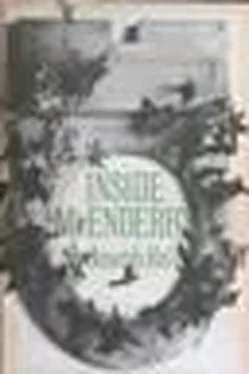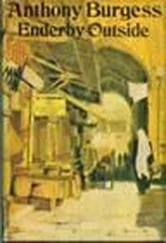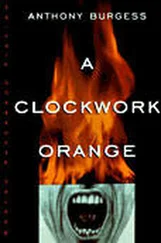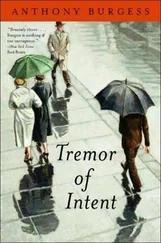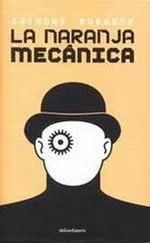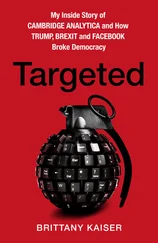A poem began to twitch as he weighed his suitcase and paid his embarkation fee and bought his bus ticket:
Stepmother of the West…
Enderby waited with excitement for the images to come into focus-Emperor and Pope the same pantomime dame, no more red meat since spate of it in snaring arena, old bitch she-wolf with hanging dugs, the big backyard of broken columns for the refuse-collector; Enderby waited with impatience for the rhymes to line up. City, titty. Beyond that was nothing.
Stepmother of the West, of venal cities
Most venal something something she-wolf bitch
Romulus Remus something something titties
Something something something something rich which ditch pitch
On the bus to Ciampino Enderby, frowning, called on his Muse to do something about this ragged donnée. On the aircraft, placed next to a Negro clergyman, Enderby muttered and grimaced so that the stewardess came up to ask if everything was all right. A suspicious character, muttering and frowning, a mink coat on the luggage rack overhead, Enderby looked down on Rome. He had forgotten all about Vesta already. He had expected that he would be able to recite, under his breath, at least a stanza of this poem in valediction. Thwarted and somewhat apprehensive, remembering the prophecy of the traitor Rawdiffe, he could only devise a farewell that went beyond words but which the Negro clergyman apparently took to be an adverse comment on his colour. Fffffrrrrrerrrrrpshhhhhh.
"You've got absolutely nothing to worry about there," said Dr Preston Hawkes. "The plates are negative: no TB, no carcinoma, nothing." He held up a couple of cloudy portraits of the inner Enderby. "That's the lot, then." He had a loud Northern voice, some of the vowels home-made approximations to Received Standard. "You can go away with a contented mind." He was young and highly dentate, tanned, and tousled as though to advertise, for a side-line, the healthful properties of the resort where he practised. "If bicarb helps that dyspepsia, you just stick to bicarb. But fundamentally your stomach and guts are perfectly sound."
"You would say, would you," said Enderby, "that I'm quite unlikely to die in the near future?"
"Oh, my dear fellow," said Dr Preston Hawkes, "none of us can ever know that. Apart from the normal hazards of living-getting run over or electrocuted or slipping in the bathroom-there must always be some unknown factor that doesn't yield to examination. We know a lot," he confided, "but we don't know everything. But, as far as I can see, you're physically sound and likely to live for many years." He glowed at Enderby like a frying slice of potato. "Of course," he said, "your tone isn't as good as it might be. Take exercise: tennis, golf, walks. You could do with paring yourself down a bit. Keep off fried things; don't eat too much starch. You're a sedentary worker, aren't you? A clerk or something?"
"Perhaps in the older sense," said Enderby. "I am," he explained sadly, "a poet."
"You mean," said Dr Preston Hawkes incredulously, "that's your job?"
"It was," said Enderby. "That's really why I came to see you. You see, I'm not writing any more poems."
"Oh." Dr Preston Hawkes became agitated; he tapped contrary-motion five-finger exercises on his desk, his smile fixed and nervous. He spoke now slackly, bubbling. "Well, I hardly think-I mean, that's nothing to do with me, is it? I mean, I should have thought-That is to say, if you don't propose writing any more poetry, well, good luck to you. The very best of luck and all that sort of thing. But that's entirely your own affair, isn't it? That's what I'd say, anyway." He now began to perform, though ineptly, the ritual of a man whose time is valuable: a syndrome of nervous grubbing among papers, looking at his watch, peering exophthalmically above Enderby's head as though the next patient was due to squeeze in between door and lintel.
"No," said Enderby, "you've got that wrong. What I mean is that I can't write poetry any more. I try and try, but nothing happens, nothing will come. Can you understand what I mean?"
"Oh, yes," said the doctor, smiling warily. "I quite see that. Well, I shouldn't worry too much about it if I were you. I mean, there are other things in life, aren't there? The sun is shining, the children are playing." That was literally true; Dr Preston Hawkes lifted a hand as if he himself were conjuring the warm evening shaft through the window, the noise of an infant squabble on the road to the beach. "I mean, writing poetry isn't the whole of life, is it? You're bound to find something else to do. Life is still all before you. The best is yet to be."
"What," asked Enderby, "is the purpose of life?"
The doctor brightened at this question. He was young enough to have answers to it, answers clearly remembered from pipe-puffing student discussions. "The purpose of life," he said promptly, "is the living of it. Life itself is the end of life. Life is here and now and what you can get out of it. Life is living by the square inch and the round minute. The end is the process. Life is what you make it. I know what I'm talking about, believe you me. I am, after all, a doctor." He smiled towards something framed on the wall, his duly certified twin baccalaureate.
Enderby shook his head in vigorous gloom. "I don't think Keats would have given you that answer. Or Shelley. Or Byron. Or Chatterton. Man," said Enderby, "is a tree. He bears fruit. When he stops bearing fruit life cuts him down. That's why I wanted to know whether I was going to die."
"Look," said the doctor sharply, "this is all a lot of morbid nonsense. It's everybody's duty to live. That's what the National Health Service is for. To help people to live. You're a healthy man with years of life ahead of you, and you ought to be very glad and very grateful. Otherwise, let's face it, you're blaspheming against life and God and, yes, democracy and the National Health Service. That's hardly fair, is it?"
"But what do I live for?" asked Enderby.
"I've told you what you live for," said the doctor, more sharply. "You weren't paying attention, were you? You live for the sake of living. And, yes, you live for others, of course. You live for your wife and children." He granted himself a two-second smirk of fondness at the photograph on his desk: Mrs Preston Hawkes playing with Master Preston Hawkes, Master Preston Hawkes playing with teddy-bear.
"I had a wife," said Enderby, "for a very short time. I left her nearly a year ago. In Rome it was. We just didn't get on. I'm quite sure I have no children. I think I can say that I'm absolutely sure about that."
"Well, all right then," said the doctor. "But there are lots of other people who need you, surely. Friends and so on. I take it," he said cautiously, "that there are still people left who like to read poetry."
"That," said Enderby, "is written. They've got that. There won't be any more. And," he said, "I'm not the sort of man who has friends. The poet has to be alone." This platitude, delivered rhetorically in spite of himself, brought a glassy look to his eyes; he got up stiffly from his chair. The doctor, who had seen television plays, thought he descried in Enderby the lineaments of impending suicide. He was not a bad doctor. He said:
"You don't propose to do anything silly, do you? I mean, it wouldn't do anybody any good, would it, that sort of thing? I mean, especially after you've been to see me and so on. Life," he said, less certainly than before, "has to be lived. We all have a duty. I'll get the police on to you, you know. Don't start doing anything you shouldn't be doing. Look, I'll arrange an appointment with a psychiatrist, if you like." He made the gesture of reaching at once for the telephone, of being prepared to tap, at once, all the riches of the National Health Service for the benefit of Enderby.
Читать дальше
